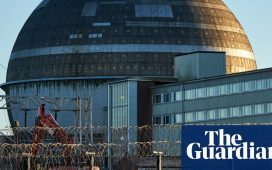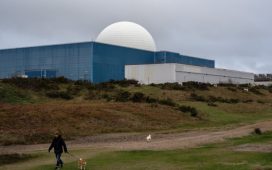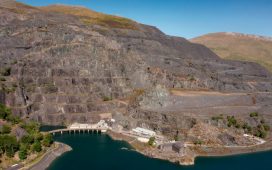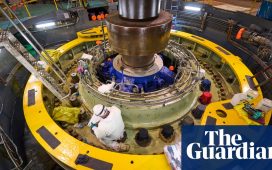Unlock the Editor’s Digest for free
Roula Khalaf, Editor of the FT, selects her favourite stories in this weekly newsletter.
The UK government will announce support for two carbon capture and storage projects on Friday as part of a drive to invest £22bn in the sector over 25 years.
The two projects are the HyNet scheme, which would capture emissions from factories and power plants in north-west England and north Wales and store them under the seabed in Liverpool Bay; and the East Coast Cluster, which would take emissions from industry around Teesside, north-east England, and store them at a site under the North Sea.
CCS involves trapping carbon dioxide as it is produced, compressing it and pumping it underground, sometimes into depleted oil and gas reservoirs, to avoid it being released into the atmosphere.
Ministers have long promised to develop the nascent technology, which is seen as crucial to the UK’s legally binding goal of cutting carbon emissions to net zero by 2050.
There are lingering questions about its commercial and technical feasibility at scale, however. Carbon capture capacity globally reached about 51mn tonnes last year, according to BloombergNEF, or 0.14 per cent of global emissions, including projects in the US, Canada and Norway.
An early plan to provide £1bn of taxpayer funding to CCS projects was scrapped in 2015, infuriating industry leaders. In 2023, Jeremy Hunt, then Tory chancellor, committed £20bn of investment in CCS projects over two decades. But none of that funding was made available before this year’s general election.
The Labour government’s commitment of £22bn is over a longer timeframe, but will provide reassurance to heavy industry as it tries to decarbonise.
Senior ministers will say that the Treasury will now make a more concrete commitment to the technology, providing certainty for the fledgling industry, according to Whitehall and industry figures.
The HyNet and the East Coast Cluster projects are on “Track 1”, meaning they are closest to getting full regulatory approval.
HyNet involves companies including Italian oil producer Eni, which plans to develop carbon dioxide pipelines and the storage site in Liverpool Bay, and Essar, which plans to capture emissions from oil refining and hydrogen production at its Stanlow oil refinery in Cheshire.
The East Coast Cluster, meanwhile, involves oil companies including BP and Equinor, which are developing a gas-fired power station with carbon capture in Teesside, as well as pipelines and a storage site alongside TotalEnergies.
The government also hopes to develop a further two clusters as part of a so-called “Track 2” process, which is to follow several years behind — Viking in Humberside and Acorn in north-east Scotland.
Britain has an existing plan to capture 20mn to 30mn tonnes of carbon dioxide annually by 2030. The UK emitted 384.2mn tonnes of carbon dioxide equivalent in 2023, according to provisional government figures.
Some operators are hoping to not only reduce domestic emissions but also store carbon shipped in from other countries.
CCS is controversial among some scientists and environmentalists who believe that industry is using it to prolong the life of fossil fuel assets. But groups including the Climate Change Committee, which advises the government, believe the technology is necessary for the UK to meet its climate targets.
Climate Capital

Where climate change meets business, markets and politics. Explore the FT’s coverage here.
Are you curious about the FT’s environmental sustainability commitments? Find out more about our science-based targets here









